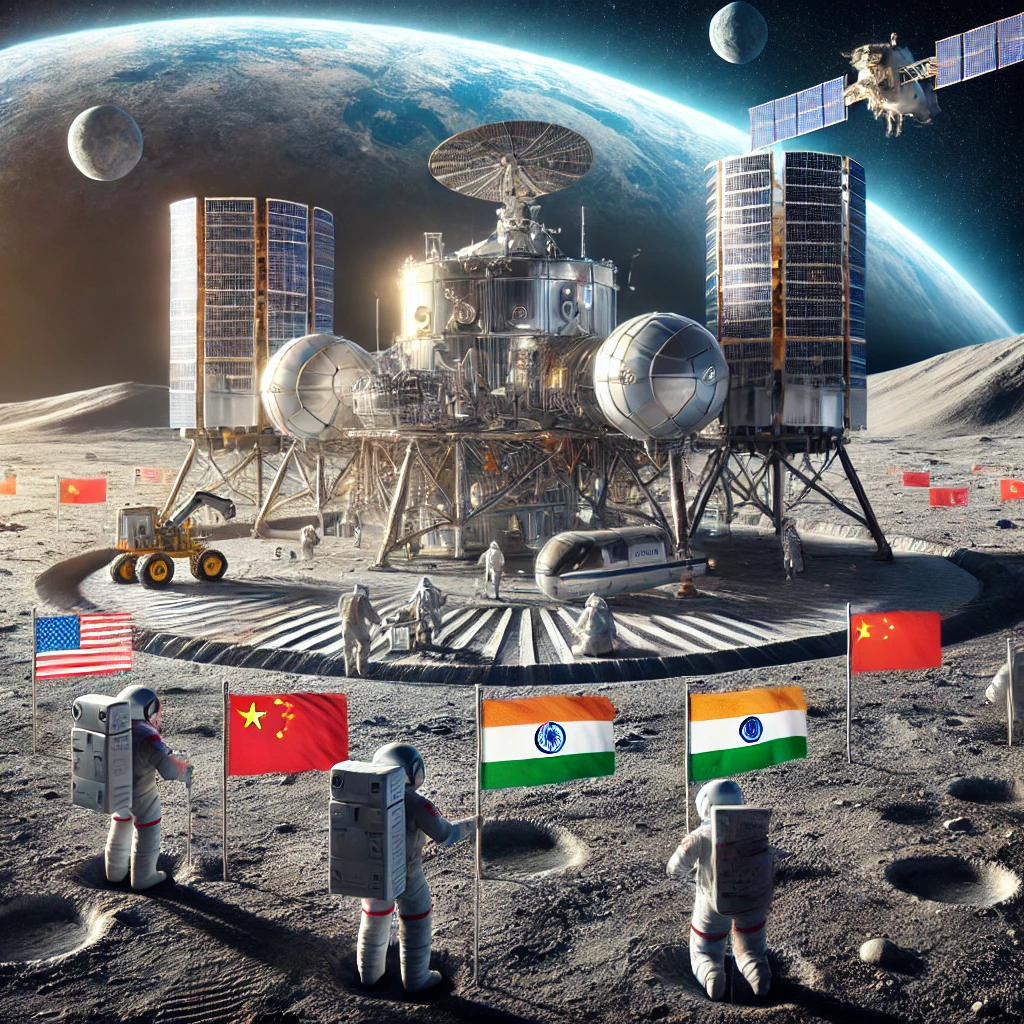The Moon has become a hot topic in recent years, as more countries and companies set their sights on exploring its surface and harnessing its resources. This new era of lunar exploration has sparked a race for dominance in space. China, India, Japan, and the US are among the nations and companies that have successfully landed spacecraft on the Moon. Plans are also underway to establish permanent bases and send humans back to the Moon. However, this space race could potentially lead to tensions and conflicts, as the laws governing space exploration are struggling to keep up with the rapid progress.
According to the Outer Space Treaty of 1967, no nation can claim ownership of the Moon. Instead, it is considered the property of all humankind and should be explored for the benefit of all nations. However, the driving force behind this treaty was the fear of space becoming a military battleground during the Cold War. The current space race is different, as it involves not only nations but also private companies. This raises questions about how the exploration and exploitation of the Moon’s resources should be regulated.
While nations ultimately remain the key players in lunar exploration, private companies are increasingly involved. However, these companies still need authorization from a state to go into space, which is limited by international treaties. The prestige and economic benefits of joining the elite club of Moon landers are significant. Additionally, the Moon’s resources, including minerals and water, hold great value. Water, in particular, is in high demand as it can be used for drinking, generating oxygen, and making rocket fuel.
The US has attempted to establish new principles for lunar exploration through the Artemis Accords. These principles state that the extraction and use of resources on the Moon should comply with international treaties, but some new rules may be necessary. Over 40 countries have signed up to these non-binding agreements, but China is notably absent. Some argue that new rules for lunar exploration should be led by the United Nations to ensure the involvement of all countries.
Access to resources on the Moon could potentially lead to conflicts, especially in areas close to ice-filled craters. The first-mover advantage will play a significant role in determining the size and location of future lunar bases. The US and China are likely to be the first settlers, adding a new layer of rivalry to their already tense relationship. The rules established by the first settlers may shape future regulations for lunar exploration.
In conclusion, the Moon is becoming a contested space as more countries and companies aim to explore its surface and exploit its resources. The current laws governing space exploration are struggling to keep up with the rapid progress, leading to tensions and conflicts. The establishment of new principles and regulations for lunar exploration is necessary to ensure the fair and peaceful utilization of the Moon’s resources. The involvement of the United Nations and international cooperation will be crucial in shaping the future of lunar exploration.
Original news source: Who owns the Moon? A new space race means it could be up for grabs (BBC)
🎧 Listen:
Slow
Normal
Fast
📖 Vocabulary:
| 1 | harnessing | Utilizing something effectively for a specific purpose |
| 2 | dominance | The state of having control or power over others |
| 3 | tensions | Mental or emotional strain caused by conflicting interests |
| 4 | exploitation | The act of using something in an unfair or selfish way |
| 5 | authorization | Official permission or approval |
| 6 | prestige | High status or respect gained by notable achievements |
| 7 | extraction | The process of removing or obtaining something from a source |
| 8 | non-binding | Not legally obligatory or enforceable |
| 9 | craters | Large, bowl-shaped cavities on the surface of a planet or moon |
| 10 | rivalry | Competition or antagonism between individuals or groups |
| 11 | contested | Disputed or challenged, often in terms of ownership or control |
| 12 | regulations | Rules or directives made and maintained by an authority |
| 13 | compliance | The act of conforming to a rule or standard |
| 14 | settlers | People who move to a new area to establish a community |
| 15 | cooperation | The process of working together towards a common goal |
Group or Classroom Activities
Warm-up Activities:
– News Summary
Instructions: In pairs or small groups, students will read the article and then write a summary of the main points. They should include information about the current space race, the laws governing space exploration, the involvement of private companies, and the potential conflicts over lunar resources. After writing their summaries, students can share and compare their responses with the rest of the class.
– Opinion Poll
Instructions: Students will form pairs and take turns asking each other questions related to the article. They should ask for opinions on topics such as the ownership of the Moon, the involvement of private companies, and the role of international cooperation. Each student should record their partner’s responses and then summarize the overall opinions in the class.
– Word Association
Instructions: Write the word “Moon” on the board. Students will then take turns saying a word or phrase that they associate with the Moon. The associations can be related to the article or personal connections. Encourage students to explain their associations to the class. This activity can generate discussion and help students make connections to the topic.
– Sketch It
Instructions: Provide each student with a piece of paper and a pencil. In pairs, one student will describe a scene or concept related to lunar exploration while the other student sketches it. The students can switch roles and repeat the activity. Afterward, students can share their sketches with the class and explain the scene or concept they were trying to depict.
– Pros and Cons
Instructions: Divide the class into two groups: one in favor of lunar exploration and the other against it. Each group will brainstorm and discuss the pros and cons of lunar exploration. Afterward, each group will present their arguments to the class. Encourage students to consider the economic, scientific, environmental, and geopolitical aspects of the issue.
🤔 Comprehension Questions:
1. What is the driving force behind the Outer Space Treaty of 1967?
2. How does the current space race differ from the Cold War era?
3. What are some of the resources on the Moon that hold great value?
4. How are private companies involved in lunar exploration?
5. What are the principles stated in the Artemis Accords?
6. Why is China notably absent from the countries that have signed the Artemis Accords?
7. What role does the first-mover advantage play in determining the size and location of future lunar bases?
8. Why is it necessary to establish new principles and regulations for lunar exploration?
Go to answers ⇩
🎧✍️ Listen and Fill in the Gaps:
The Moon has become a hot topic in recent years, as more countries and companies set their sights on exploring its surface and harnessing its resources. This new era of lunar exploration has sparked a race for dominance in (1)______. China, India, Japan, and the US are among the nations and companies that have successfully landed spacecraft on the Moon. Plans are also (2)______ to establish permanent bases and send humans back to the Moon. However, this space race could potentially lead to tensions and (3)______, as the laws governing space exploration are struggling to keep up with the rapid progress.
According to the Outer Space (4)______ of 1967, no nation can claim ownership of the Moon. Instead, it is considered the property of all humankind and should be explored for the benefit of all nations. However, the driving force behind this treaty was the fear of space becoming a military battleground during the Cold War. The (5)______ space race is different, as it (6)______ not only nations but also private (7)______. This raises questions about how the exploration and exploitation of the Moon’s resources should be regulated.
While nations ultimately remain the key players in lunar exploration, private companies are increasingly involved. However, these companies still need authorization from a state to go into space, which is limited by (8)______ treaties. The prestige and economic benefits of joining the elite club of Moon landers are significant. Additionally, the Moon’s resources, including minerals and water, hold great value. Water, in particular, is in high demand as it can be used for drinking, generating oxygen, and making rocket fuel.
The US has attempted to establish new principles for (9)______ exploration through the (10)______ Accords. These principles state that the extraction and use of (11)______ on the Moon should comply with international treaties, but some new rules may be necessary. Over 40 (12)______ have signed up to these non-binding agreements, but China is notably absent. Some argue that new rules for lunar exploration should be led by the United Nations to ensure the involvement of all countries.
Access to resources on the Moon could potentially lead to conflicts, especially in areas close to ice-filled craters. The first-mover advantage will play a significant role in determining the size and location of future lunar bases. The US and China are likely to be the first settlers, adding a new layer of rivalry to their already tense relationship. The rules established by the first settlers may shape future regulations for lunar exploration.
In conclusion, the Moon is becoming a contested space as more countries and companies aim to explore its surface and exploit its resources. The current laws governing space exploration are (13)______ to keep up with the rapid progress, leading to tensions and conflicts. The establishment of new principles and regulations for lunar exploration is (14)______ to ensure the fair and peaceful utilization of the Moon’s resources. The involvement of the (15)______ Nations and international (16)______ will be crucial in shaping the future of lunar exploration.
Go to answers ⇩
💬 Discussion Questions:
Students can ask a partner these questions, or discuss them as a group.
1. What do you think about the idea of establishing permanent bases on the Moon?
2. How would you feel if private companies were the main players in lunar exploration, rather than nations?
3. Do you think it is fair that no nation can claim ownership of the Moon? Why or why not?
4. What is your opinion on the involvement of the United Nations in regulating lunar exploration?
5. How do you think conflicts over access to resources on the Moon could be resolved?
6. Do you think the first-mover advantage in lunar exploration is important? Why or why not?
7. What are your thoughts on the US and China potentially becoming the first settlers on the Moon?
8. How would you feel if new rules for lunar exploration were led by the United Nations?
9. What do you think are the potential benefits and drawbacks of extracting and using resources on the Moon?
10. How do you think the involvement of private companies in lunar exploration will impact the future of space exploration?
11. Do you think it is important for all countries to be involved in shaping the regulations for lunar exploration? Why or why not?
12. How would you feel if conflicts over lunar resources escalated into military conflicts?
13. What are your thoughts on the economic benefits of joining the elite club of Moon landers?
14. Do you believe that the laws governing space exploration should be updated to keep up with rapid progress? Why or why not?
15. How do you think international cooperation can ensure the fair and peaceful utilization of the Moon’s resources?
Individual Activities
📖💭 Vocabulary Meanings:
Match each word to its meaning.
Words:
1. harnessing
2. dominance
3. tensions
4. exploitation
5. authorization
6. prestige
7. extraction
8. non-binding
9. craters
10. rivalry
11. contested
12. regulations
13. compliance
14. settlers
15. cooperation
Meanings:
(A) The process of working together towards a common goal
(B) Large, bowl-shaped cavities on the surface of a planet or moon
(C) Not legally obligatory or enforceable
(D) Mental or emotional strain caused by conflicting interests
(E) The act of conforming to a rule or standard
(F) The process of removing or obtaining something from a source
(G) Official permission or approval
(H) The state of having control or power over others
(I) Utilizing something effectively for a specific purpose
(J) High status or respect gained by notable achievements
(K) The act of using something in an unfair or selfish way
(L) Disputed or challenged, often in terms of ownership or control
(M) Rules or directives made and maintained by an authority
(N) Competition or antagonism between individuals or groups
(O) People who move to a new area to establish a community
Go to answers ⇩
🔡 Multiple Choice Questions:
1. What is the driving force behind the Outer Space Treaty of 1967?
(a) The desire to claim ownership of the Moon
(b) The need to regulate private companies in space exploration
(c) Fear of space becoming a military battleground
(d) The goal of establishing permanent bases on the Moon
2. Which countries and companies have successfully landed spacecraft on the Moon?
(a) Russia, Germany, France, and Australia
(b) China, India, Japan, and the US
(c) Brazil, South Africa, Mexico, and Canada
(d) Italy, Spain, Greece, and Sweden
3. What is the key role of nations in lunar exploration?
(a) They provide authorization for private companies
(b) They regulate the extraction and use of resources on the Moon
(c) They are the main players
(d) They establish new principles and regulations for lunar exploration
4. What are the Moon’s resources that hold great value?
(a) Minerals and water
(b) Oxygen and rocket fuel
(c) Gold and silver
(d) Helium and lithium
5. What are the Artemis Accords?
(a) International treaties governing space exploration
(b) Principles for lunar exploration established by the US
(c) New rules for the extraction and use of resources on the Moon
(d) Agreements signed by over 40 countries for the fair utilization of the Moon’s resources
6. Who is notably absent from the signatories of the Artemis Accords?
(a) Russia
(b) India
(c) Japan
(d) China
7. What could potentially lead to conflicts in lunar exploration?
(a) Access to resources, especially in areas close to ice-filled craters
(b) The involvement of private companies
(c) The establishment of permanent bases on the Moon
(d) The rapid progress in space exploration
8. What is necessary to ensure the fair and peaceful utilization of the Moon’s resources?
(a) The involvement of the United Nations and international cooperation
(b) The dominance of one nation in lunar exploration
(c) The authorization of private companies by a state
(d) The establishment of new principles and regulations
Go to answers ⇩
🕵️ True or False Questions:
1. Access to resources on the Moon, particularly water, could lead to conflicts.
2. Private companies are minimally involved in lunar exploration, but still require authorization from a state.
3. The establishment of new principles and regulations for lunar exploration is necessary to ensure fair and peaceful utilization of the Moon’s resources.
4. Over 30 countries have signed up to the non-binding agreements of the Artemis Accords.
5. The Moon has become a secondary point for exploration and resource exploitation in recent years.
6. The Outer Space Treaty of 1968 states that no nation can claim ownership of the Moon.
7. The US has proposed new principles for lunar exploration through the Artemis Accords.
8. China, India, Japan, and the US have successfully landed spacecraft on the Moon.
Go to answers ⇩
📝 Write a Summary:
Write a summary of this news article in two sentences.
Check your writing now with the best free AI for English writing!
Writing Questions:
Answer the following questions. Write as much as you can for each answer.
Check your answers with our free English writing assistant!
1. What is the driving force behind the Outer Space Treaty of 1967?
2. How are private companies involved in lunar exploration?
3. What are the potential benefits of accessing the Moon’s resources?
4. What are the principles stated in the Artemis Accords?
5. How could conflicts arise in the race for lunar resources?
✅ Answers
🤔✅ Comprehension Question Answers:
1. The driving force behind the Outer Space Treaty of 1967 was the fear of space becoming a military battleground during the Cold War.
2. The current space race differs from the Cold War era as it involves not only nations but also private companies.
3. Some of the resources on the Moon that hold great value include minerals and water.
4. Private companies are involved in lunar exploration by obtaining authorization from a state to go into space and participating in the extraction and use of resources on the Moon.
5. The principles stated in the Artemis Accords are that the extraction and use of resources on the Moon should comply with international treaties, but some new rules may be necessary.
6. China is notably absent from the countries that have signed the Artemis Accords because it has its own space program and may have differing views on the regulation of lunar exploration.
7. The first-mover advantage plays a significant role in determining the size and location of future lunar bases, as the first settlers have the opportunity to establish their presence and potentially claim more favorable areas for resource extraction.
8. It is necessary to establish new principles and regulations for lunar exploration to ensure the fair and peaceful utilization of the Moon’s resources and to address the challenges posed by the involvement of private companies and the potential for conflicts over access to resources.
Go back to questions ⇧
🎧✍️✅ Listen and Fill in the Gaps Answers:
(1) space
(2) underway
(3) conflicts
(4) Treaty
(5) current
(6) involves
(7) companies
(8) international
(9) lunar
(10) Artemis
(11) resources
(12) countries
(13) struggling
(14) necessary
(15) United
(16) cooperation
Go back to questions ⇧
📖💭✅ Vocabulary Meanings Answers:
1. harnessing
Answer: (I) Utilizing something effectively for a specific purpose
2. dominance
Answer: (H) The state of having control or power over others
3. tensions
Answer: (D) Mental or emotional strain caused by conflicting interests
4. exploitation
Answer: (K) The act of using something in an unfair or selfish way
5. authorization
Answer: (G) Official permission or approval
6. prestige
Answer: (J) High status or respect gained by notable achievements
7. extraction
Answer: (F) The process of removing or obtaining something from a source
8. non-binding
Answer: (C) Not legally obligatory or enforceable
9. craters
Answer: (B) Large, bowl-shaped cavities on the surface of a planet or moon
10. rivalry
Answer: (N) Competition or antagonism between individuals or groups
11. contested
Answer: (L) Disputed or challenged, often in terms of ownership or control
12. regulations
Answer: (M) Rules or directives made and maintained by an authority
13. compliance
Answer: (E) The act of conforming to a rule or standard
14. settlers
Answer: (O) People who move to a new area to establish a community
15. cooperation
Answer: (A) The process of working together towards a common goal
Go back to questions ⇧
🔡✅ Multiple Choice Answers:
1. What is the driving force behind the Outer Space Treaty of 1967?
Answer: (c) Fear of space becoming a military battleground
2. Which countries and companies have successfully landed spacecraft on the Moon?
Answer: (b) China, India, Japan, and the US
3. What is the key role of nations in lunar exploration?
Answer: (c) They are the main players
4. What are the Moon’s resources that hold great value?
Answer: (a) Minerals and water
5. What are the Artemis Accords?
Answer: (b) Principles for lunar exploration established by the US
6. Who is notably absent from the signatories of the Artemis Accords?
Answer: (d) China
7. What could potentially lead to conflicts in lunar exploration?
Answer: (a) Access to resources, especially in areas close to ice-filled craters
8. What is necessary to ensure the fair and peaceful utilization of the Moon’s resources?
Answer: (d) The establishment of new principles and regulations
Go back to questions ⇧
🕵️✅ True or False Answers:
1. Access to resources on the Moon, particularly water, could lead to conflicts. (Answer: True)
2. Private companies are minimally involved in lunar exploration, but still require authorization from a state. (Answer: False)
3. The establishment of new principles and regulations for lunar exploration is necessary to ensure fair and peaceful utilization of the Moon’s resources. (Answer: True)
4. Over 30 countries have signed up to the non-binding agreements of the Artemis Accords. (Answer: False)
5. The Moon has become a secondary point for exploration and resource exploitation in recent years. (Answer: False)
6. The Outer Space Treaty of 1968 states that no nation can claim ownership of the Moon. (Answer: False)
7. The US has proposed new principles for lunar exploration through the Artemis Accords. (Answer: True)
8. China, India, Japan, and the US have successfully landed spacecraft on the Moon. (Answer: True)
Go back to questions ⇧















